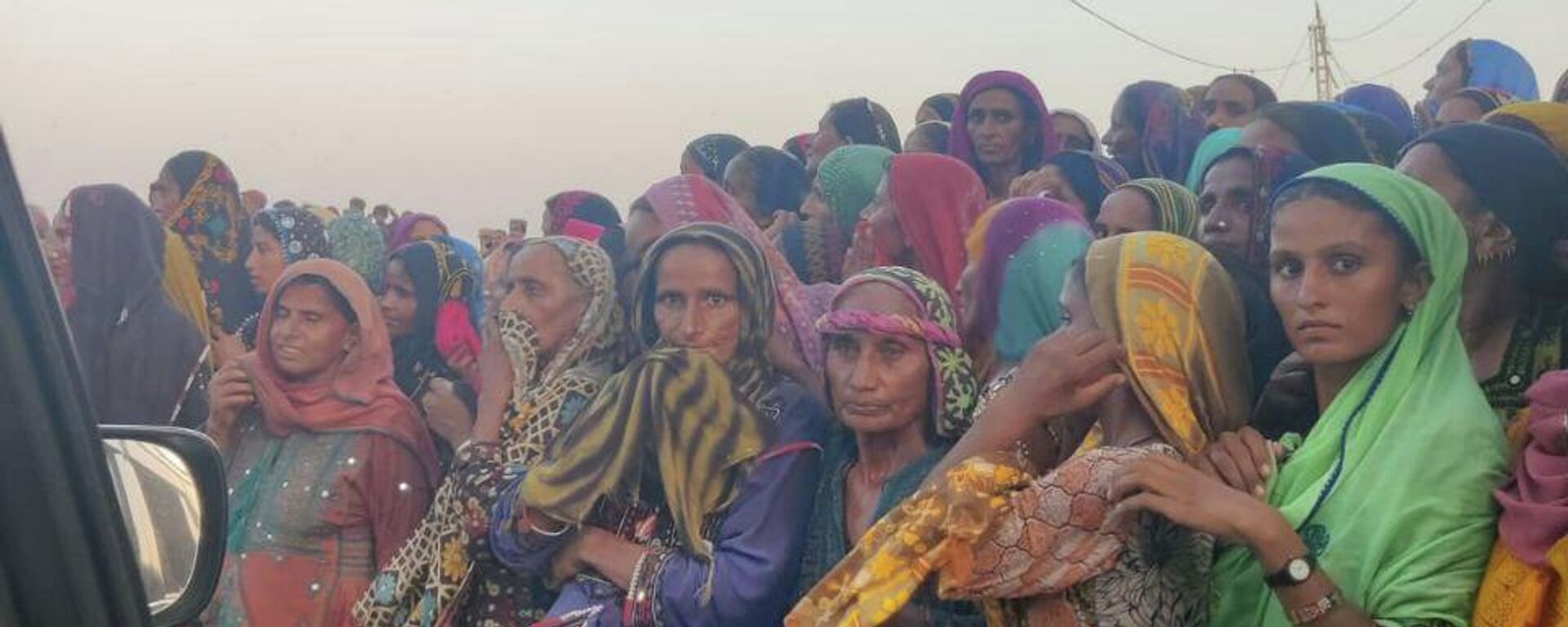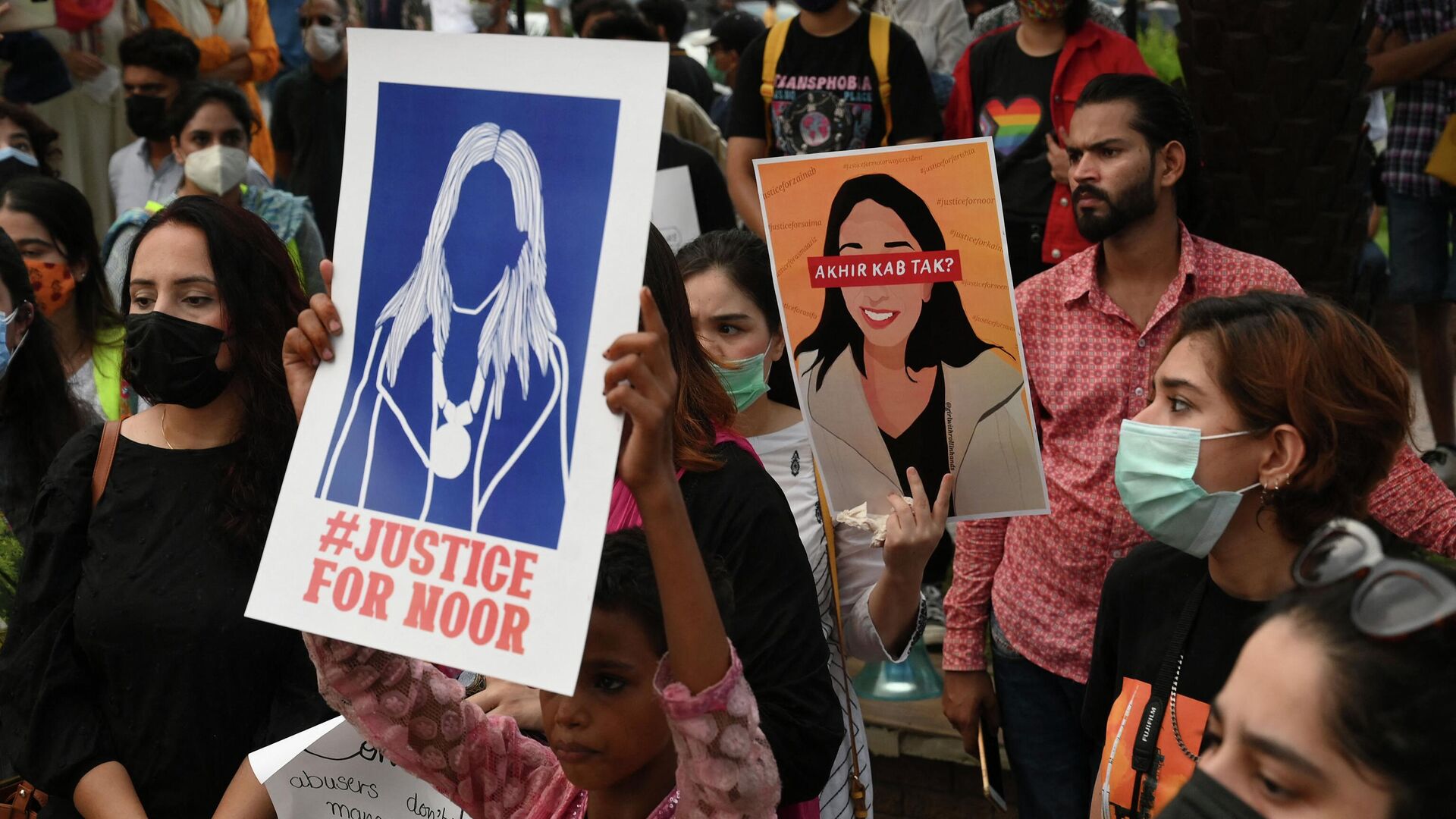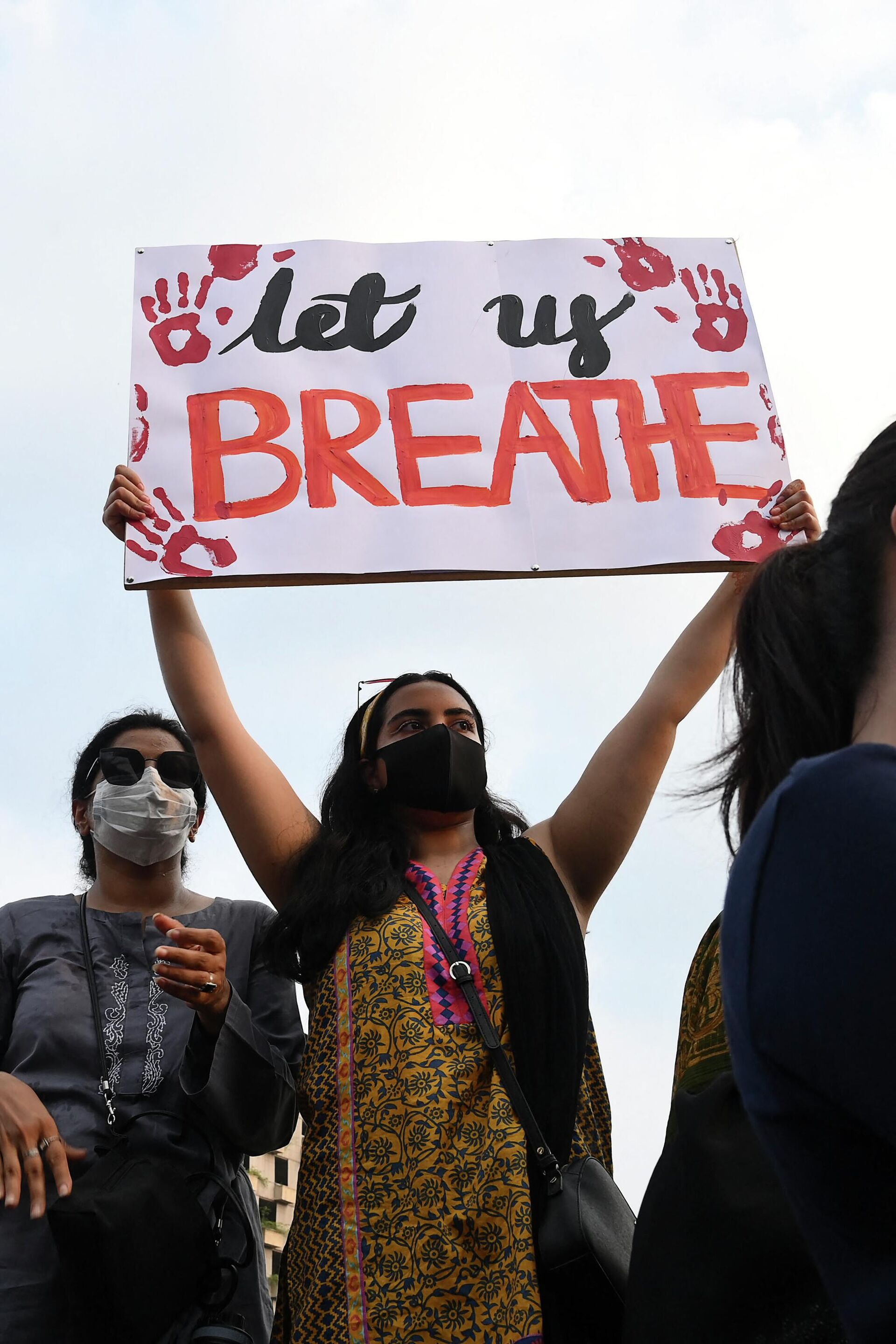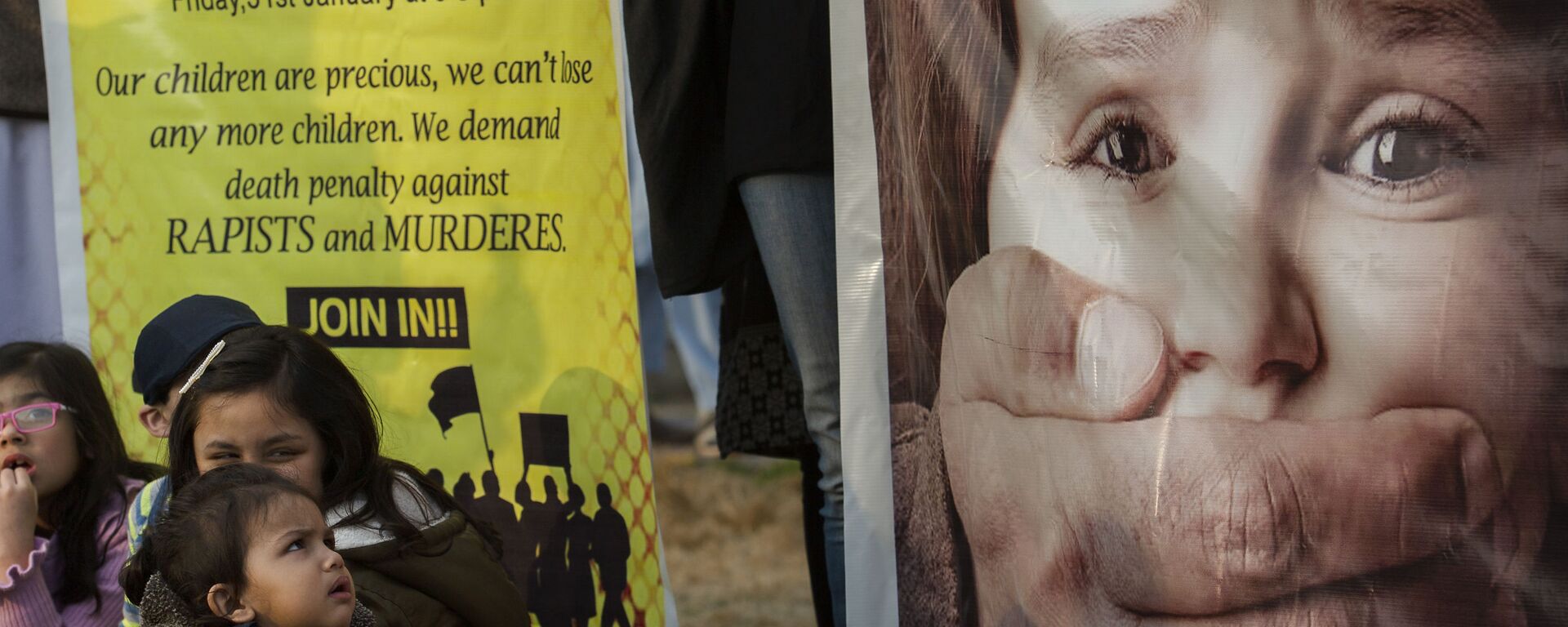https://sputnikglobe.com/20221017/let-us-breathe-a-look-inside-pakistans-rising-epidemic-of-gender-violence-1101959941.html
'Let Us Breathe': A Look Inside Pakistan's Growing Epidemic of Gender Violence
'Let Us Breathe': A Look Inside Pakistan's Growing Epidemic of Gender Violence
Sputnik International
Pakistan is among the worst ranked countries in the index where domestic violence is widespread and where thousands of women and girls are murdered or... 17.10.2022, Sputnik International
2022-10-17T17:06+0000
2022-10-17T17:06+0000
2022-12-08T18:02+0000
world
woman
social issues
domestic violence
crime
asia
pakistan
https://cdn1.img.sputnikglobe.com/img/07e6/0a/11/1101964483_0:0:3073:1728_1920x0_80_0_0_b9eeeec1051f6b3d0fc95bdf7ef24a82.jpg
According to the World Economic Forum, Pakistan ranked 153rd out of 156 nations on the Global Gender Gap 2021 index. The report further said that in order to close the gender gap, the country would need 136.5 years.The cases of kidnapping, assault, public harassment and rape against women have also seen a rise in recent years, with some reports calling the current situation a "gender violence epidemic."The numbers on paper are high, but in reality they are much higher because convictions are rarely brought forward by the victims, as they suffer in silence.What About the Laws?Constitutionally, Pakistani women are able to vote, participate in elections, hold public offices and pursue most professions. The sections 8 to 28 of the Constitution of Pakistan ensure equal opportunities and fundamental rights to all, without discrimination on the basis of ethnicity, sex or gender (with some limitations in regards to minorities).However, due to continued violence against women, Pakistan's government further created laws such as the Muslim Personal Law of Sharia (addressing a woman's right to inherit all forms of property), the Muslim Family Law Ordinance or MFLO, intended to protect women against harm and more recently Women's Protection Bill.Then there was the Sexual Harassment Bill to ensure women's safety in public and work spaces, while the Prevention of Anti-Women Practices Bill aimed to constitutionally protect them against discriminatory social practices, such as forced marriages, aimed to deprive women of their inheritance rights.The issue with these laws is that they grant and protect women rights theoretically, but not practically.According to a prominent women's rights activist, Farzana Bari, there is a lack of seriousness on the part of the government to implement these laws and educate women to empower them and come forward to speak against such crimes.A similar observation was made in a report by UN Women Asia and the Pacific, which stated that although Pakistan has several laws and policies against various forms of violence, challenges remain in implementing these measures.So what is the reason behind these laws not being implemented and the cases of gender violence rising?According to the United Nations Population Fund (UNFPA), Pakistan is structurally and culturally a patriarchal society, where social norms promote gender-based abuses, women are discouraged to come forward and disclose the abuse and women are often blamed for the abuse they face.It is widely believed that poorer communities and illiterate populace face violent crimes against women, however, in Pakistan that is not the case. Sometimes, men from affluent families, with education and modern worldview also commit domestic violence.In some cases, such men have been known to commit horrible murders also.The Case That Shocked the CountryIn July 2021, the country was shocked when Noor Mukadam, a young woman in her late 20s, was tortured and then beheaded by her male friend, Zahir Jaffar, in an affluent area of Islamabad.They both came from respectable families, as Noor's father was a former diplomat while Zahir Jaffar's family were business tycoons.The two families knew each other, and Noor and Jaffar had a close relationship, but she reportedly turned down his marriage proposal, which got him angry, so he killed her.Jaffar held Noor hostage for over 38 hours at his residence, where he allegedly beat her with knuckledusters and raped her. She tried to escape from the window multiple times, but could not get away. After hours of tormenting her, Jaffar killed and then beheaded her.When the news broke, Pakistan was shocked! As the horrifying details of the murder started to emerge, Pakistanis protested both online and in person, demanding #JusticeforNoor.Based on the complaint of Noor’s father, a First Information Report (FIR) was registered against Jaffar under Section 302 (premeditated murder) of the Pakistan Penal Code (PPC). He was arrested the next day and sent to a three-day physical custody.FIR is a written document prepared by the police when they receive information about the commission of a cognizable offense.Noor's heartbroken family spent months in and out of courts and all the while publicly advocating for the country to stand with Noor and with other victims.The brutal murder devastated Noor's mother and father, but they fought for justice against Jaffar and his family until the end, demanding maximum punishment.In court proceedings, it was established that the killer was not insane. The court was presented with a report by the doctors at Rawalpindi Central Jail Adiala that declared Zahir medically “completely fit.”Finally after months, on February 24, the sessions court in Islamabad sentenced Jaffar to death for the murder of Noor Mukadam.In July 2022, Noor's parents, friends and civil society members observed a vigil at F-9 Park in Islamabad on the occasion of her first death anniversary. The participants continue their efforts to this day, to make sure that Jaffar receives the punishment as soon as possible.According to Noor's family, Jaffar is not only the killer of Noor: his action had also caused fear and panic among women across the country.There is a definite fear and panic among women of Pakistan because violence spiked in 2021 and 2022, with an exponential number of cases registered in Punjab, Sindh, and Islamabad.Report on 'State of Violence Against Women, Children' Launched in PakistanSustainable Social Development Organization (SSDO) published a report called, "State of Violence against Women & Children in Pakistan: District Wise Analysis" to provide accurate data on the occurrence and statistics of violence against women and children.The report is published bi-annually, with the data from 2020 and 2021 collected from media tracking of Pakistan’s six most widely read newspapers (three Urdu and three English) and data from the government for cases officially registered with the police (by filing Right to Information requests).This is the first report of its kind where the data is not based on estimates or projections, but through official data obtained from the police in terms of FIRs registered. Just in the province of Punjab, a comparative analysis showed a 14% increase in the number of rape cases of women going from 3,772 to 4,329, which is still believed to be vastly underreported. Similarly, there was a 47 % rise in honor killings which jumped from 134 to 197.In Sindh, the highest frequency was seen in the kidnapping of women, with a staggering 94.68 % growth from 1,334 cases registered in 2020 to 2,597 cases in 2021, indicating a two-fold increase.What this report also showed, is that in terms of media tracking, the number of cases reported were tiny by the actual number of cases that took place. That shows that the majority of such cases get no media traction at all.Furthermore, the report also found that across all the indicators concerning women and children’s social wellbeing, a record 52,370 cases were reported. However, only 8,719 cases were reported in the media.Light At the End of the Tunnel?Despite these grim numbers, there are incredible women and men in the country who are working very hard to bring about change, but it is not enough because there is not enough representation of women in power. Just one example to prove this, is the fact that in the police force only 3% of the officers are women.Similarly, the current makeup of Pakistan’s parliament is only 21 % female. In the National Assembly, which consists of 342 members, female representation is only around 3% if reserved seats are excluded (there are 60 seats reserved for women).Pakistan’s low percentage of women in the workforce, around 25%, also runs counter to global trends for countries with similar income levels. Hence, structural reforms are needed within the country.One example of a positive step forward is a newly established unit in the capital of the country.In Islamabad, a unit called Gender Protection Unit (GPU) was set up under Amna Baig. Its aim is to tackle violence in a domestic context - where fathers, brothers and husbands commit assaults against women.The GPU is a big step forward for the country because it is run only by women and the victim can come and report the crime anonymously to a fellow woman officer. There is also child care in case a mother needs to come with her children, and the unit’s sole purpose is to hear out the woman victim and help her out.According to reports, GPU received 550 cases in just 3 months, and half of them were related to domestic violence.Another positive step towards closing the gender gap is Aurat March, where each year thousands of women and men march in different cities across Pakistan with slogans and placards, to create awareness and demand end of violence against women. Aurat means woman in Urdu.The participants of this march are mostly people from the middle and affluent classes. Noor Mukadam also used to walk for Aurat March with her friends.Although women are standing up and fighting back, Pakistan still has a long way to go to ensure women’s safety within the country.Changes need to be made in the highest echelons of the government, there should also be many more women run NGOs and protection units, like the GPU, where women can come to report a crime and seek help in a safe environment.Currently, victims, especially those from lower-class backgrounds, can spend years fighting for justice in Pakistan’s infamous judicial system. Pakistan’s culture of sexism and misogyny, is prevalent in the government, courts, media and in every other social sphere. That also needs to change, for real progress to take place.As the country will close the gender gap with more women placed in places of power and influence, they will be able to advocate for change and implement legislations and laws for women's protection and equality.The views expressed in this column are those of the author and do not necessarily reflect the position of Sputnik.
https://sputnikglobe.com/20210727/justicefornoor-pakistanis-protest-against-beheading-of-former-diplomats-daughter-1083468674.html
https://sputnikglobe.com/20221010/videos-survival-of-thousands-at-stake-in-pakistans-jacobabad-relief-worker-says-1101659817.html
pakistan
Sputnik International
feedback@sputniknews.com
+74956456601
MIA „Rosiya Segodnya“
2022
Aneela Rashid
https://cdn1.img.sputnikglobe.com/img/07e6/09/0e/1100768477_0:338:606:944_100x100_80_0_0_af078d1bbaf1e33c21f16169e9ed7a5f.jpg
Aneela Rashid
https://cdn1.img.sputnikglobe.com/img/07e6/09/0e/1100768477_0:338:606:944_100x100_80_0_0_af078d1bbaf1e33c21f16169e9ed7a5f.jpg
News
en_EN
Sputnik International
feedback@sputniknews.com
+74956456601
MIA „Rosiya Segodnya“
Sputnik International
feedback@sputniknews.com
+74956456601
MIA „Rosiya Segodnya“
Aneela Rashid
https://cdn1.img.sputnikglobe.com/img/07e6/09/0e/1100768477_0:338:606:944_100x100_80_0_0_af078d1bbaf1e33c21f16169e9ed7a5f.jpg
woman, social issues, domestic violence, crime, pakistan
woman, social issues, domestic violence, crime, pakistan
According to the World Economic Forum, Pakistan ranked 153rd out of 156 nations on the Global Gender Gap 2021 index. The report further said that in order to close the gender gap, the country would need 136.5 years.
The cases of kidnapping, assault, public harassment and rape against women have also seen a rise in recent years, with some reports calling the current situation a "gender violence epidemic."
The numbers on paper are high, but in reality they are much higher because convictions are rarely brought forward by the victims, as they suffer in silence.
Constitutionally, Pakistani women are able to vote, participate in elections, hold public offices and pursue most professions. The sections 8 to 28 of the Constitution of Pakistan ensure equal opportunities and fundamental rights to all, without discrimination on the basis of ethnicity, sex or gender (with some limitations in regards to minorities).
However, due to continued violence against women, Pakistan's government further created laws such as the Muslim Personal Law of Sharia (addressing a woman's right to inherit all forms of property), the Muslim Family Law Ordinance or MFLO, intended to protect women against harm and more recently Women's Protection Bill.
Then there was the Sexual Harassment Bill to ensure women's safety in public and work spaces, while the Prevention of Anti-Women Practices Bill aimed to constitutionally protect them against discriminatory social practices, such as forced marriages, aimed to deprive women of their inheritance rights.
The issue with these laws is that they grant and protect women rights theoretically, but not practically.
According to a prominent women's rights activist, Farzana Bari, there is a lack of seriousness on the part of the government to implement these laws and educate women to empower them and come forward to speak against such crimes.
A similar observation was made in a report by UN Women Asia and the Pacific, which stated that although Pakistan has several laws and policies against various forms of violence, challenges remain in implementing these measures.
"Many women still lack access to free or affordable essential services in sectors such as health, police, justice and social support to ensure their safety, protection and recovery. Not enough is done to prevent violence, which is the most challenging but also effective way to eliminate violence in a sustainable way," the UN report read.
So what is the reason behind these laws not being implemented and the cases of gender violence rising?
According to the United Nations Population Fund (UNFPA), Pakistan is structurally and culturally a patriarchal society, where social norms promote gender-based abuses, women are discouraged to come forward and disclose the abuse and women are often blamed for the abuse they face.
It is widely believed that poorer communities and illiterate populace face violent crimes against women, however, in Pakistan that is not the case. Sometimes, men from affluent families, with education and modern worldview also commit domestic violence.
In some cases, such men have been known to commit horrible murders also.
The Case That Shocked the Country
In July 2021, the country was shocked when Noor Mukadam, a young woman in her late 20s, was tortured and then beheaded by her male friend, Zahir Jaffar, in an affluent area of Islamabad.
They both came from respectable families, as Noor's father was a former diplomat while Zahir Jaffar's family were business tycoons.
The two families knew each other, and Noor and Jaffar had a close relationship, but she reportedly turned down his marriage proposal, which got him angry, so he killed her.
Jaffar held Noor hostage for over 38 hours at his residence, where he allegedly beat her with knuckledusters and raped her. She tried to escape from the window multiple times, but could not get away. After hours of tormenting her, Jaffar killed and then beheaded her.
When the news broke, Pakistan was shocked! As the horrifying details of the murder started to emerge, Pakistanis protested both online and in person,
demanding #JusticeforNoor.Based on the complaint of Noor’s father, a First Information Report (FIR) was registered against Jaffar under Section 302 (premeditated murder) of the Pakistan Penal Code (PPC). He was arrested the next day and sent to a three-day physical custody.
FIR is a written document prepared by the police when they receive information about the commission of a cognizable offense.
Noor’s father Shaukat Mukadam demanded capital punishment for the accused saying, "I've been saying that this is not just my daughter's case, it is a case for all the daughters of my country."
Noor's heartbroken family spent months in and out of courts and all the while publicly advocating for the country to stand with Noor and with other victims.
The brutal murder devastated Noor's mother and father, but they fought for justice against Jaffar and his family until the end, demanding maximum punishment.
In court proceedings, it was established that the killer was not insane. The court was presented with a report by the doctors at Rawalpindi Central Jail Adiala that declared Zahir medically “completely fit.”
Finally after months, on February 24, the sessions court in Islamabad sentenced Jaffar to death for the murder of Noor Mukadam.
In July 2022, Noor's parents, friends and civil society members observed a vigil at F-9 Park in Islamabad on the occasion of her first death anniversary. The participants continue their efforts to this day, to make sure that Jaffar receives the punishment as soon as possible.
According to Noor's family, Jaffar is not only the killer of Noor: his action had also caused fear and panic among women across the country.
There is a definite fear and panic among women of Pakistan because violence spiked in 2021 and 2022, with an exponential number of cases registered in Punjab, Sindh, and Islamabad.
Report on 'State of Violence Against Women, Children' Launched in Pakistan
Sustainable Social Development Organization (SSDO) published a report called, "State of Violence against Women & Children in Pakistan: District Wise Analysis" to provide accurate data on the occurrence and statistics of violence against women and children.
The report is published bi-annually, with the data from 2020 and 2021 collected from media tracking of Pakistan’s six most widely read newspapers (three Urdu and three English) and data from the government for cases officially registered with the police (by filing Right to Information requests).

10 October 2022, 14:47 GMT
This is the first report of its kind where the data is not based on estimates or projections, but through official data obtained from the police in terms of FIRs registered.
Just in the province of Punjab, a comparative analysis showed a 14% increase in the number of rape cases of women going from 3,772 to 4,329, which is still believed to be vastly underreported. Similarly, there was a 47 % rise in honor killings which jumped from 134 to 197.
In Sindh, the highest frequency was seen in the kidnapping of women, with a staggering 94.68 % growth from 1,334 cases registered in 2020 to 2,597 cases in 2021, indicating a two-fold increase.
What this report also showed, is that in terms of media tracking, the number of cases reported were tiny by the actual number of cases that took place. That shows that the majority of such cases get no media traction at all.
Furthermore, the report also found that across all the indicators concerning women and children’s social wellbeing, a record 52,370 cases were reported. However, only 8,719 cases were reported in the media.
Light At the End of the Tunnel?
Despite these grim numbers, there are incredible women and men in the country who are working very hard to bring about change, but it is not enough because there is not enough representation of women in power. Just one example to prove this, is the fact that in the police force only 3% of the officers are women.
Similarly, the current makeup of Pakistan’s parliament is only 21 % female. In the National Assembly, which consists of 342 members, female representation is only around 3% if reserved seats are excluded (there are 60 seats reserved for women).
"These numbers are emblematic of a male-dominated political culture which -- along with other socio-economic factors -- creates a glass ceiling for women’s political advancement," according to Shahzia Mehboob Tanoli for T-Edit.
Pakistan’s low percentage of women in the workforce, around 25%, also runs counter to global trends for countries with similar income levels. Hence, structural reforms are needed within the country.
One example of a positive step forward is a newly established unit in the capital of the country.
In Islamabad, a unit called Gender Protection Unit (GPU) was set up under Amna Baig. Its aim is to tackle violence in a domestic context - where fathers, brothers and husbands commit assaults against women.
The GPU is a big step forward for the country because it is run only by women and the victim can come and report the crime anonymously to a fellow woman officer. There is also child care in case a mother needs to come with her children, and the unit’s sole purpose is to hear out the woman victim and help her out.
According to reports, GPU received 550 cases in just 3 months, and half of them were related to domestic violence.
Another positive step towards closing the gender gap is Aurat March, where each year thousands of women and men march in different cities across Pakistan with slogans and placards, to create awareness and demand end of violence against women. Aurat means woman in Urdu.
Some slogans seen on the last year's march read, “Let us breathe,” “My body, My choice,” “Vaccine against patriarchy needed,” and many more.
The participants of this march are mostly people from the middle and affluent classes. Noor Mukadam also used to walk for Aurat March with her friends.
Although women are standing up and fighting back, Pakistan still has a long way to go to ensure women’s safety within the country.
Changes need to be made in the highest echelons of the government, there should also be many more women run NGOs and protection units, like the GPU, where women can come to report a crime and seek help in a safe environment.
Currently, victims, especially those from lower-class backgrounds, can spend years fighting for justice in Pakistan’s infamous judicial system. Pakistan’s culture of sexism and misogyny, is prevalent in the government, courts, media and in every other social sphere. That also needs to change, for real progress to take place.
As the country will close the gender gap with more women placed in places of power and influence, they will be able to advocate for change and implement legislations and laws for women's protection and equality.
The views expressed in this column are those of the author and do not necessarily reflect the position of Sputnik.








